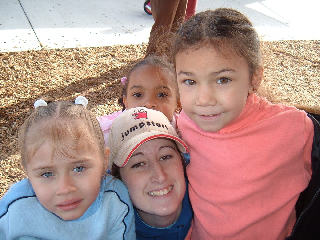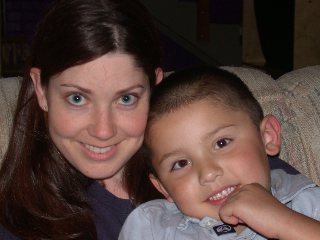Jan and Bud Richter Center
Assignments
The following is a sample assignment taken from Professor Richard Berrett's 2004 CFS 133S course. For another example of how to articulate your service-learning assignment to students, see the Sample SL Syllabus Template.
Assignments in Children and Families in Crisis Course: e.g. Service-Learning, (200 points)
"Education without social action is a one-sided value because it has no true power potential. Social action without education is a weak expression of pure energy." Martin Luther King Jr.
Often the deepest learning is accomplished through EXPERIENCE. One type of experience is found by giving in your community. In our consumption oriented and time-restricted worlds, this giving is too often limited to "token" amounts of money, e.g., buying a raffle ticket or going to a fund-raising dinner. The act of giving one's time and energy as a service to others seems to have fallen out of fashion among many people. When service in our communities is organized in the context of the curriculum of a course so that the student’s learning is enhanced and the community benefits it is known as service-learning. CFS 133-S is one of the service-learning courses on our campus.
The goals of the service-learning assignment are to facilitate the process of giving of yourself in a setting that is DIVERSE from your normal realms of experience and enhance the academic learning or the course curriculum through the community service and the associated papers. Another benefit of service learning is the insight you may gain into yourself and others as you explore unique territory. In addition, you may find your sense of interconnectedness with others is strengthened.
In past semesters, some student's have suggested this is the most significant assignment of their college courses, perhaps it will be meaningful for you. I have arranged five possibilities for your service obligation. We will discuss each, and you will meet the contact people, in class. Please do not start contacting these agencies until after they present in class! You must do your service at one of these sites. They are:
- 1. Kids’ Turn - Divorce (contact: Gary Malone, 278-5139)
- Footsteps – Childhood Grief (contact: Susie Kuszmar)
- Academy for New Americans – tutoring Hmong immigrant children (contact: May Moua, 253-6528 ext 404)
- Holy Cross Center for Women – homelessness/poverty (contact: Arcelia Pereschica, 237-3379)
- Fresno Interdenominational Refugee Mission – war/migration (contact: Rev. Sharon Stanley, 487-1500)
Your task is:
- After careful consideration of the sites select one that will allow you the opportunity to provide meaningful service while enhancing your learning of the course. Prepare the Service- Learning Plan and Selection Paper: * (50 points). This paper includes the Learning Plan that will identify the selected site, your learning objectives (in very abbreviated form) and the anticipated schedule. A form signed by you and the site supervisor will be part of this paper. It should be submitted along with a typed one-page paper that briefly describes the agency, why you chose this agency, the work they do/who they serve, and what you will be doing as a volunteer. Finally, discuss what you anticipate (your anxieties and hopes) learning there.
- Complete your service. To be considered for the grade of “C” Complete a minimum of FIFTEEN hours of service in the community during the semester. For consideration of the “B” grade complete TWENTY hours and for consideration for an “A” grade on this assignment complete TWENTY-FIVE hours.
- Collect the evaluation form and/or a signed document (letterhead required or no credit will be given) that verifies your minimum volunteer hours and the quality of your service. The quality of you service to the agency is so important that it will be considered in your grade on this assignment. Your supervisor will report issues such as attitude, punctuality, dedication, and notification to the agency if you cannot keep a specific commitment to be there. If there are any problems that arise for you during this service please talk to your supervisor and/or me. Also if any problems regarding the quality of your work occur, the supervisor will contact me. Throughout the semester, you will be asked to participate in discussions concerning the service-learning experience.
- Prepare a thank-you/feedback letter to the agency. Include in this letter appreciation for their help with this assignment, specific strengths and weaknesses of the experience, some comments as to the ways the service-learning experience related to the course and the overall benefits of the experience.
- Prepare Final S-L Reflection Paper using the three identifiable sections which follow: A. Service Description: Where the assignment was completed and the basis (WHY) for its selection. Some information regarding the HISTORY of the agency is appropriate in this section. Also consider what SOCIAL PROBLEM(s) the agency is working on and the specific INTERVENTIONS they use. B. Reactions: In the context of self-exploration and self-discovery complete a description of your FEELINGS, OBSERVATIONS, PERSONAL VALUES, ATTITUDES and even ETHICAL ISSUES related to the experience. You may consider your reactions to being at the site that is diverse from your normal experiences, any shifts in your attitude, as well as your INTENTIONS upon completing the assignment. C. Relation to Course Content: A DEPTH analysis of the experience in relation to at least FIVE NUMBERED SPECIFIC PRINCIPLES and CONCEPTS of the course. This section needs to identify specific elements of the course from lectures, texts, discussions, and videos that are amplified by your community service. The goal of this section is to illustrate that the accomplishment of service enhances your academic study and learning.
- Submit the paper, copy of thank-you/feedback letter and signed documentation and evaluation (150 points) with the cover page on the appropriate due date. Be prepared to discuss the experience.
Source: Dr. Richard Berrett, California State University Service-Learning Scholar

